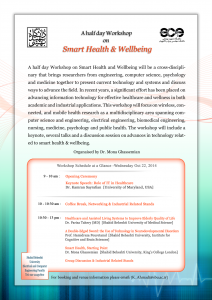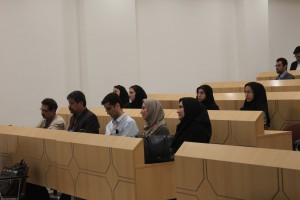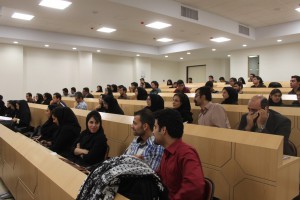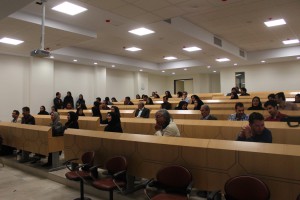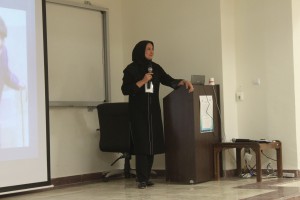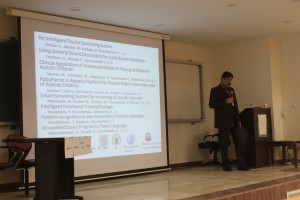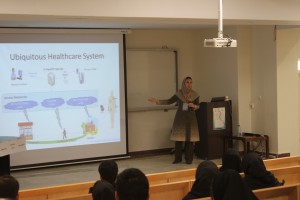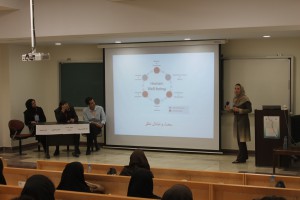1st Smart Health and Wellbeing Workshop was a half day workshop and held on 22 October 2014 and included a keynote, several talks and a discussion session on advances in technology related to smart health and wellbeing.
you can find more details about the workshop speeches, speakers and photos in the following.
Keynote Speech: Role of IT in Healthcare
Dr. Kamran Sayrafian [University of Maryland]
Abstract: Advances in the Information and Communication Technologies are expected to enable new services in the healthcare industry. Proper use of these technologies could help to increase the quality of care and at the same time prevent the rising cost of healthcare. However, there are still many challenging issues due to the multi-disciplinary nature of this field. In this talk, several ICT trends that are expected to facilitate the progress in this domain will be briefly discussed.
Healthcare and Assisted Living Systems to Improve Elderly Quality of Life
Dr. Parisa Taheri [Shahid Behshti University of Medical Science]
Abstract: With growth of elderly population in the world, research societies in various field aim to give different solutions to improve the quality of life of vulnerable group. It is expected to have approximately 2 billion of elderly population in 2050, out of which 80% of them will be in developing counties. Based on published statistics in 2011, more than 6 million elderly live in Iran (8.2% of population) and it is expected that the elderly population increases to about 21% to 24% in 2050. Hence special attention is demanded to their requirements to increase their quality of living.
Use of technologies for indirect monitoring of personal functionality, especially those who live alone, can protect privacy policy and monitoring daily activities. By monitoring daily activities we can find disorders in living habits.
Currently an approximate 8.9% of elderly live alone in Iran. This causes several problems in elderly life. However increasing life expectancy is a one of important parameter in the development of countries, but lack of improving life quality in vulnerable group such as elderly can impact economic and insurance. Interaction between fields to find important problems in elderly and present efficient solutions can be an effective step in improving life quality of elderly group.
A Double-Edged Sword: the Use of Technology in Neurodevelopmental Disorders
Prof. Hamidreza Pouretemad [Shahid Beheshti University, Institute for Cognitive and Brain Science]
Abstract: Neurodevelopmental disorders (NDDs) are deficiencies of the growing brain with onset during developmental period. The NDDs are associated with a wide variation of cognitive, emotional and psycho-motor symptoms with a great impact on the personal, social, academic, or occupational functioning. Commonly known NDDs include: Intellectual Disabilities, Communication Disorders, Autism Spectrum Disorder (ASD), Attention-Deficit/Hyperactivity Disorder, Specific Learning Disorder.
The ASDs are well known NDDs that have become the focus of multidisciplinary works. Machine base clinical practices have increasingly brought clinicians and engineers to act in concert, during past the decade. In this speech, 4 studies will be reviewed. They would show the application of machine to diagnosis (screening), treatment/education and follow-up the treatment effects in children with autistic disorders. Positive and negative consequence of this approach will be discussed.
Smart Health, Starting Point
Dr. Mona Ghassemian [Shahid Beheshti University, King’s Collage London]
Abstract: The ‘smart citizen’ is our starting point. People, who because of these new opportunities are able to contribute to the development of their own living environment and healthcare system. Increasingly- smart health and wellbeing systems and the ICT are not only moving the point of care closer to the patient, but the patient can now assume a more active role in his or her own care. These technologies, coupled with (1) the migration of the health care industry to electronic patient records and (2) the emergence of a growing number of enabling health care technologies (e.g., novel biosensors, wearable devices, implant sensors and intelligent software agents), demonstrate unprecedented potential for delivering highly automated, intelligent healthcare in the home.
In this talk, different initiatives to guideline a smart and wireless healthcare and wellbeing, namely a remote elderly activity monitoring pilot project will be presented. It will be presented that such smart home projects with a focus on health and wellbeing require cooperation between higher education, university, related authorities, companies, creative industry and citizens.
